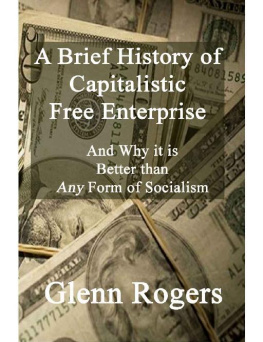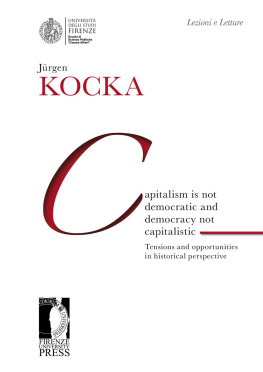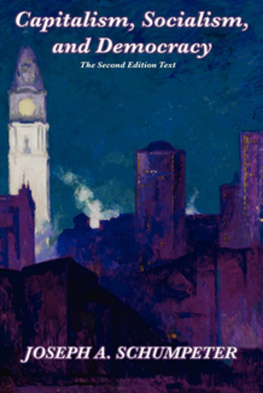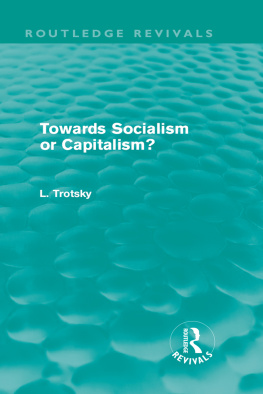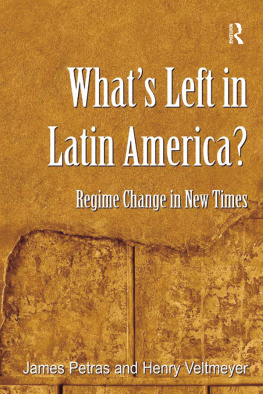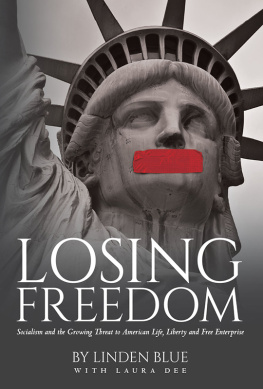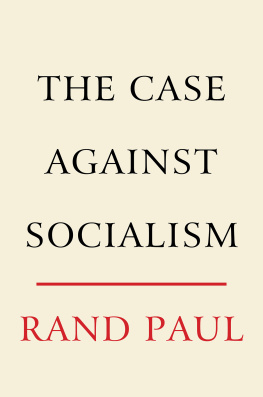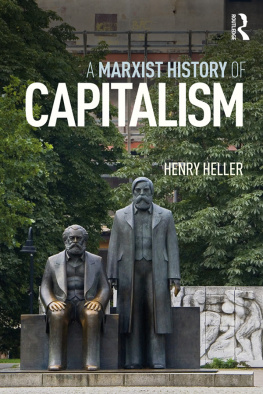Table of Contents
Introduction
Chapter 1 Understanding the Terms Capitalism and Socialism
DefinitionalChallenges
AnAnalogy
WhatWe Will See
Summary
Chapter 2 The First Great Social Transition
FromHunter-Gatherers to Settled Villagers
TheDevelopment of Early Societies and Economies
TheEconomies of the Ancient World
Summary
Chapter 3 The Economies of Ancient Israel, Greece, and Rome
Israel
Greece
Rome
Slaveryin the Ancient World
Summary
Chapter 4 The Middle Ages: The Riseand Fall of Feudalism
The Fall of Rome
ANew Social Structure, A New Economic Structure
Challengesand Changes
TheDecline of Feudalism
TheEmergence of the Nation-State
Summary
Chapter 5 The Industrial Revolution
NewWays of Thinking, New Ways of Doing
TheEvolution of Capitalism
Wasthe Evolution of Capitalism a Good Thing
Summary
Chapter 6 The Great Socialist Experiments of the TwentiethCentury
TheRelationship Between Socialism and Communism
TheFailed Socialism/Communism Experiments of the 20th Century
TheUnited Soviet Socialist RepublicThe USSR
ThePeoples Republic of China
Cuba
Summary
Chapter 7 Which Socioeconomic System, Socialism or Capitalism
Helps People Achieve Their FullPotential
Equalityand the Social Justice Issue
Self-determinationand Personal Responsibility
ModernSocial Democracies Or Welfare States
RobinHood Taxation
HelpingPeople to Help Themselves
ConfusionAbout Terms
ReasonsWhy Capitalism is Better than Socialism
TheNew Socialism
Problemswith the New Socialism
Summary
Conclusion
Introduction
Before I retired from academia, I taughtIntroduction to Sociology probably thirty times or more. When we would get tothe chapter on government, politics, and economics (which are often covered inthe same chapter) I was always distressed at how uninformed students were regardingcapitalism and socialism. I also find it distressing that so many in our society,and even in our government, have embraced socialism as a viable socioeconomicsystem and want to remake America into a socialist society. The 2016 and 2020 Presidentialcandidate, Bernie Sanders, is one of them. Along with Bernie, a number ofdemocratic politicians have embraced socialism. One is a young woman named Alexandria Ocasio -Cortez. In the summer of 2018, she won anelection in her New York district, defeating her Republican opponent so thatshe is now a member of the House. Being only twenty-eight years old and anavowed socialist, Ocasio -Cortezs victory generated alot of media attention. Naturally, she did a lot of interviews. In one of them,when asked about her views regarding capitalism and socialism, she commentedthat capitalism hasnt been around a very long time. When America was settledand established, she asserted, there was no capitalism. I was both amused and confusedby her assertion. I had heard that she was a graduate of Boston Universitysprogram in economics. Surely she knew better than to say that early Americansettlers were not capitalistic in their economic activities. What else couldthey have been? They certainly werent socialistic. They owned and controlledtheir own resourcesmeager as those resources sometimes were. Of coursethey were capitalists. They engaged in free enterprise.
Curious as to the source of Ms. Ocasio -Cortezs confusion, I began to review some of theliterature with which some of her professors might have been familiar. Theproblem became immediately apparent. For instance, in her book, The Origins of Capitalism, Ellen Meiksins Wood, defines capitalism as:
[A] system in which goods andservices, down to the most basic necessities of life, are produced forprofitable exchange, where even human labour -power isa commodity for sale in the market, and where all economic actors are dependenton the market... Capitalism differs from other social forms because producersdepend on the market for access to the means of production Above all, it is asystem in which the bulk of societys work is done by propertyless labourerswho are obliged to sell their labour-power in exchange for a wage in order togain access to the means of life and of labour itself Few would say that thecapitalist system existed in earnest before the sixteenth or seventeenthcentury, and some would place it as late as the eighteenth, or perhaps even thenineteenth, when it matured into its industrial form.
If one did not know better, one might acceptthis sort of negative sounding, Marxist-influenced definition as a true andaccurate explanation of capitalism, which could lead one to reach a conclusionsimilar to Ms. Ocasio -Cortezs. However, when onelooks up the definition of capitalism in a dictionary of economics, thedefinition is quite different from the one given above.
It is apparent that Marxist-orientedeconomists and sociologists are playing fast and loose with the definition ofcapitalism in order to align themselves with Marx and continue his negativesocialist critique of capitalism. The problem is that what they are saying issimply not true, and playing fast and loose with a definition to make a thingeasier to criticize is intellectually dishonest.
One of the things Marxist-orientedeconomists and sociologists like to do is claim that capitalism as an economicsystem is relatively new. It is not. Capitalistic free enterprise is ancient.It is the way humans have done business pretty much since there has beenbusiness to do. Over the centuries, captialism has evolved into something more complexthan it was, say, 10,000 years ago. But the fundamentals of the system are thesame. In this small book, I intend to provide a brief historical overview ofeconomics, demonstrating that capitalistic free enterprise has, for the most part,been the economic choice of humans since human societies formed and peoplebegan doing business with one another.
But before we begin our historical survey,we need to understand what the terms capitalism and socialism actually mean.Chapter 1, therefore, will focus on definitions.
Chapter 1
Understanding the Terms Capitalism andSocialism
Language is not static. It is dynamic. Themeanings of words sometimes change. But not all the time, andsometimes not at all. The meanings of technical terms almost never change.For instance, the word pneumonia refers to a, lung inflammation caused bybacterial or viral infection, in which the air sacs fill with pus and maybecome solid . The word pneumonia does not refer to an intestinaldisorder. Never has, never will. An entomologist is a person who studiesinsects. It never refers to a person who studies volcanoes. That person is avolcanologist. While the meaning of popular words sometimesevolve to mean or refer to something new, the meanings of technicalterms remain the same. And yet sometimes academics like playing fast and loosewith definitions so they can make an argument that they would otherwise not beable to make. This unfortunate reality has happened in relation to the termscapitalism and socialism.
Part of thechallenge, especially as it relates to socialism, is that we are often dealingwith two different groups of people. One is composed of actual socialists whoknow what the word means and are advocating actual socialism. They are truesocialists. The other is a group of people who seem blissfully unaware of whatsocialism actually is. They call themselves socialists, but do not appear toadvocate actual socialism. What they seem to want are social programs fundedand overseen by the government with money they take from the wealthy bycollecting extremely high taxes from them. They arent especially opposed tocapitalism

